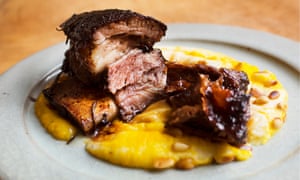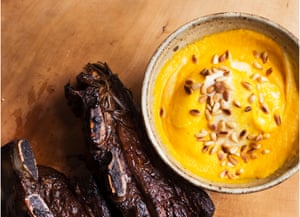I wrap up and head out to the butchers, where there is oxtail and pork belly on the counter and a fine double rib of beef with creamy fat and a hefty price tag. Tucked away, almost in hiding, are two rows of thick beef short ribs, strips of meat and a wide ribbon of fat still on its bones, at a decent price, and that fits my needs like a sheepskin glove.
We haven’t had beef for ages, and the idea of a reasonably priced cut appeals. I could marinate it, roast at a high temperature then lower the heat and let meat and bones do their own thing for an hour or two – that is how I would usually cook a row of short ribs. Instead I decide to brown the meat first, quickly, over a sprightly heat, and only then, when its fat is singing loudly in the pan, do I marinate it (red wine, garlic, peppercorns, some woody sticks of rosemary) and leave it in a cool place for a few hours.
Later, the oven on a fairly low heat, I pour the marinade into the roasting tin, balance a rack on it and place the ribs on top, then cover the lot with foil. I put the ribs and wine into the oven and leave them to get on with it. What emerges, 90 minutes later, is meat that has cooked in its own deeply aromatic steam, the flesh almost ready to tear from its short, thick bones.
The liquor in the base – a mixture of wine, herbs and the juices from the beef – is too good not to use, so I pour it into a wide, shallow pan and reduce it over a high heat to something approaching a dark and intense stock, dare I say jus, then sweeten it with pomegranate molasses. The point of the thick fruit syrup (basically concentrated pomegranate juice and pulp) is to introduce something of a deep, sweet-sour note and a shiny, sticky glaze.
The beef goes back into the oven, brushed generously with molasses and marinade that slowly forms a deep glossy sheen. We sit around the table, slipping the meat from its bones, scooping up mashed, buttery golden roots, abandoning knives and forks and happily, joyously, resorting to our fingers.
Beef short ribs with pomegranate molasses
The ribs can also be marinated raw. Should you take that route, then you will need to set the oven to 220C/gas mark 8 and roast them for 20 minutes before lowering the heat to 160C/gas mark 3 and continuing as suggested.
Serves 5-6
For marinade:
red wine 750ml
rosemary 5 sprigs
garlic 3 cloves
black peppercorns 8
bay leaves 3
red wine 750ml
rosemary 5 sprigs
garlic 3 cloves
black peppercorns 8
bay leaves 3
beef short ribs 2 kg
pomegranate molasses 100ml
pomegranate molasses 100ml
Get a roasting tin hot over a moderate heat, then add the ribs, letting the fat brown nicely on both sides. If they stick, add a little oil.
Make the marinade: pour the wine into a jug, add the rosemary, the garlic, bashed lightly to flatten, the peppercorns and bay leaves. Place the ribs in a strong plastic zip-lock bag then pour in the marinade. Seal the bag and place it in a tray in a cool place overnight.
To roast the beef put the oven on at 160/gas mark 3. Pour the marinade into the roasting tin, place a rack on top of the tin then place the ribs on top. Wrap loosely in a dome of foil and roast for 1 hour and 45 minutes. By this time the meat will have shrunk a little away from its bones. Remove and discard the foil dome.
Carefully remove the ribs on their rack, pour the marinade into a shallow, wide pan and bring to the boil, letting it reduce until you have 100ml. Stir in the molasses and remove from the heat. Put the ribs back on their rack, over the empty roasting tin, then brush generously with the reduced wine marinade and molasses mixture. Roast for 20 minutes, brush over more mixture then continue roasting, checking their progress carefully. You want it to be glossy, chewy, dark and sticky.
The pine kernels introduce what I feel is an essential element of crunch, but breadcrumbs, tossed in a little melted butter till golden, are a fine, and indeed cheaper, alternative.
Peel the parsnips, cut them into large chunks then bring them to the boil in a pan of deep, salted water. Do the same with the carrots, but peeling them only if they have thick skins. Turn the heat down to a lively simmer then leave to cook for about 20 minutes until they are soft enough to mash.Serves 6
parsnips 600g
carrots 700g
pine kernels 75g
parsley a small handful
butter 80g
Toast the pine kernels until golden in a dry pan then set aside. Finely chop the parsley. When the parsnips are tender, drain them, add half the butter, then mash until creamy, using a stick blender, food mixer or vegetable masher.
Drain the carrots, add the remaining butter then mash until smooth and creamy. Fold in the chopped parsley. Put the two mashes into a warm serving dish, then fold the two together, gently, so they are lightly mixed. Scatter with the toasted pine kernels.
To serve, slice the row of ribs into smaller sections, making sure everyone gets some meat and bone. Serve spoonfuls of the parsnip and carrot mash alongside.


No comments:
Post a Comment